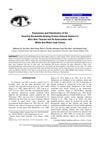12 citations,
January 2018 in “Journal of Clinical Laboratory Analysis” Certain IL-18 gene variations may increase the risk of alopecia areata.
 4 citations,
January 2016 in “International journal of reproduction, contraception, obstetrics and gynecology”
4 citations,
January 2016 in “International journal of reproduction, contraception, obstetrics and gynecology” A certain genetic variation is linked to a higher risk of polycystic ovarian syndrome.
 4 citations,
February 2015 in “Journal of Clinical Laboratory Analysis”
4 citations,
February 2015 in “Journal of Clinical Laboratory Analysis” A genetic variant in the androgen receptor gene increases heart disease risk in women but not in men.
 3 citations,
January 2018 in “Postępy Dermatologii i Alergologii”
3 citations,
January 2018 in “Postępy Dermatologii i Alergologii” Longer TA repeats in the SRD5A2 gene may increase acne risk in Chinese people.
6 citations,
March 2020 in “Anais Brasileiros de Dermatologia” CTLA4 gene variants are not linked to alopecia areata in Monterrey's Mexican population.
 11 citations,
April 2019 in “Bioscience Reports”
11 citations,
April 2019 in “Bioscience Reports” Certain genetic variations in the RAB5B gene are linked to a higher risk of polycystic ovary syndrome in Chinese Han women.
 3 citations,
December 2018 in “Meta Gene”
3 citations,
December 2018 in “Meta Gene” Certain gene variations increase male hair loss risk, influenced by hormone levels.
 16 citations,
December 2001 in “Dermatologic Therapy”
16 citations,
December 2001 in “Dermatologic Therapy” Alopecia areata has a complex genetic basis that was not fully understood as of 2001.
 12 citations,
January 2016 in “Journal of Assisted Reproduction and Genetics”
12 citations,
January 2016 in “Journal of Assisted Reproduction and Genetics” Certain gene variations are linked to higher male hormone levels in Chinese women with PCOS and insulin resistance.
15 citations,
January 2023 in “Antioxidants” Oxidative stress plays a significant role in alopecia areata, and new treatments may include JAK inhibitors and antioxidants.

Different genes cause Female Pattern Hair Loss compared to male hair loss, and treatments vary, but more research is needed to understand it fully.
Certain genetic variations are linked to hair loss in Mexican men.
 58 citations,
December 2020 in “Mayo Clinic Proceedings”
58 citations,
December 2020 in “Mayo Clinic Proceedings” The conclusion is that individual differences in COVID-19 severity are influenced by factors like age, sex, race, and genetics, which are important for personalized medicine.
 1 citations,
January 2016 in “Asian-Australasian journal of animal sciences”
1 citations,
January 2016 in “Asian-Australasian journal of animal sciences” The protein Gnαs is found more in black mice than white mice and may influence their coat color.
 February 2017 in “Cancer Causes & Control”
February 2017 in “Cancer Causes & Control” Swedish men with the E213 A-allele of the androgen receptor have a lower risk of prostate cancer.
 47 citations,
August 2014 in “The Journal of Clinical Endocrinology and Metabolism”
47 citations,
August 2014 in “The Journal of Clinical Endocrinology and Metabolism” The research suggests that the global distribution of PCOS is likely due to historical human migration and that genes affecting PCOS may have different impacts on males and females.
 41 citations,
March 2012 in “Clinical and Experimental Dermatology”
41 citations,
March 2012 in “Clinical and Experimental Dermatology” G allele of AR Stul polymorphism linked to higher hair loss risk, especially in white people.
12 citations,
July 2004 in “Molecular genetics and genomics” A new mouse mutation causes skin and hair defects due to a gene change.
 77 citations,
April 2009 in “British Journal of Dermatology”
77 citations,
April 2009 in “British Journal of Dermatology” Aromatase gene variation may increase female hair loss risk.
 23 citations,
May 2009 in “International Journal of Dermatology”
23 citations,
May 2009 in “International Journal of Dermatology” AR gene not major factor in female hair loss; different from male hair loss.
 20 citations,
January 2021 in “Plants”
20 citations,
January 2021 in “Plants” High energy boosts root hair growth in plants, while low energy stops it.
 11 citations,
January 2012 in “Journal of cell science”
11 citations,
January 2012 in “Journal of cell science” Rac1 is essential for proper hair structure and color.
 7 citations,
January 2019 in “Postepy Dermatologii I Alergologii”
7 citations,
January 2019 in “Postepy Dermatologii I Alergologii” Certain gene variations might be linked to severe acne in women but not in men.
 75 citations,
October 2010 in “Mammalian genome”
75 citations,
October 2010 in “Mammalian genome” Sphynx cats are hairless and Devon Rex cats have curly hair due to specific genetic mutations.
 19 citations,
February 2018 in “Nutrients”
19 citations,
February 2018 in “Nutrients” Certain zinc transporters are essential for healthy skin and managing zinc in the body could help treat skin problems.
 9 citations,
March 2020 in “Gene”
9 citations,
March 2020 in “Gene” Certain gene variants in estrogen receptors are linked to polycystic ovary syndrome, mainly affecting metabolism, in Tunisian women.
9 citations,
May 2019 in “Medicine” The C-allele and CC-genotype in the PTPN22 gene lower the risk of alopecia areata.
 January 2015 in “Indian Journal of Medical Biochemistry”
January 2015 in “Indian Journal of Medical Biochemistry” Men with early balding should be checked for metabolic syndrome, as there's a link between the two.
 88 citations,
August 2019 in “Nature communications”
88 citations,
August 2019 in “Nature communications” Researchers found a specific immune receptor in patients that causes severe skin reactions to a drug.
 1 citations,
September 2023 in “Acta dermato-venereologica”
1 citations,
September 2023 in “Acta dermato-venereologica” Certain genetic variants are linked to frontal fibrosing alopecia in Spanish patients.























